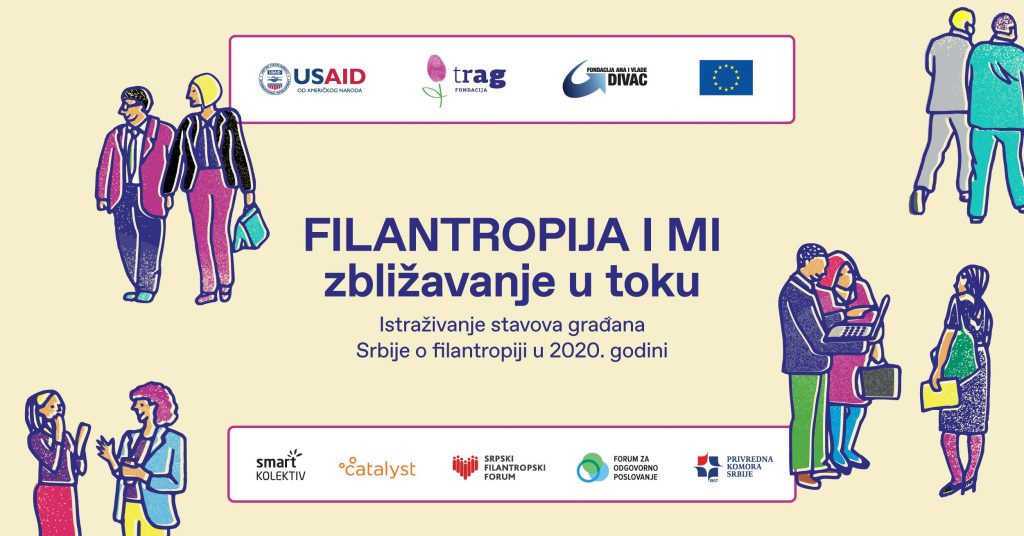On June 3, 2021, the Trag Foundation with support from the United States Agency for International Development (USAID) presented the findings of the public opinion survey about Philanthropy in Serbia in 2020, carried out by Ipsos Strategic Marketing. Based on survey findings, the strongest motivation for Serbian citizens to participate in charitable campaigns is the feeling that they are doing a good deed and the belief that they are helping to solve an important problem with their personal contribution.

Citizens were highly motivated to help children suffering from rare illnesses and disabilities, children without parental care, people with serious medical conditions, poverty-stricken individuals and victims of violence. In spite of the challenging economic situation, the average values of individual donations have increased. The average minimum and maximum amounts donated from personal means to charity in 2020 were higher than the 2018 average. Namely, the lowest average donation in 2020 was RSD 408, which is by 32 percent, or by RSD 130 higher compared to the lowest average donation from two years before. The highest average donation in 2020 was RSD 1,562, which is by 3 percent or by RSD 33 more compared to the highest average donated amount in 2018.
Trust in organizers of philanthropic campaigns was also a very important motive for citizens to take part in philanthropic activities. Foundations are ranked as highly third on the list of organizations that Serbian citizens cited as those which they would support in their goal of raising funds for a noble cause, following personal initiatives of citizens and initiatives of healthcare institutions. The Serbian public sees foundations as trustworthy entities, and they are believed to possess expert staff and the power to mobilize when launching philanthropic campaigns.
“Nearly half of the citizens would give money to a foundation that invests in the common good. Also, if they do decide to channel their money through foundations, most respondents (42 percent) would like to occasionally receive information about the course of their donation. Just over a quarter of them said that they wish to receive reports regularly, while one in ten respondents expressed readiness to personally engage as a volunteer in a campaign of contributing to the common good. To us, this indicates that it is necessary to encourage citizens to pursue other forms of giving, such as donating goods, knowledge and time, but also to provide supporting mechanisms for them, such as tax reliefs and more favorable legislation,” said Marija Mitrović, Philanthropy and Partnerships Director at Trag Foundation.
“The survey showed that it is necessary to work on increasing trust in all societal actors that deal with philanthropic activities. For the philanthropic campaigns themselves, it is important that they are conducted transparently, which is the responsibility of its organizers. It was also noted that it is necessary to enable better access to information about charitable campaigns for citizens, where the media play a key role, as they should report on them regularly and comprehensively, from start to finish,” said Jelena Avramović, Project Management Specialist at USAID Serbia.
The survey is part of the project Framework for Giving, funded by the United States Agency for International Development (USAID) and implemented by the Coalition for Giving led by the Ana and Vlade Divac Foundation. Other Coalition members include the Trag, Catalyst Balkans, SMART Kolektiv, the Serbian Philanthropy Forum, the Responsible Business Forum, and the Serbian Chamber of Commerce and Industry.
For more information about the event, please contact Emina Ferizović: emina@eminentkomunikacije.rs or via phone at +381 63 7704 876.
For more information about the Framework for Giving Project, please contact Dejan Drobnjak: dejan.drobnjak@divac.com or via phone at +381 62 77 45 43.
For more information about the USAID, please contact Mirjana Vukša-Zavišić: mvuksa@usaid.gov or via phone at +381 65 316 45 30.